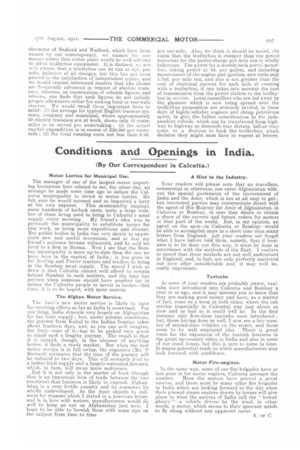Conditions and Openings in India.
Page 3

If you've noticed an error in this article please click here to report it so we can fix it.
(By Our Correspondent in Calcutta.) Motor Lorries for Municipal Use.
The manager of one of the largest motor importing businesses here related to me, the other day, an attempt he made some time ago to induce the Calcutta municipality to invest in motor lorries. He felt sure he would succeed and so imported a lorry at his own expense. This municipality employs some hundreds of bullock carts, quite a large number of these being used to bring in Calcutta's meat supply every morning. My friend's idea was to persuade the municipality to substitute lorries for this work, as being more expeditious and cleaner. But public bodies in India rise very slowly to appreciate new and useful inventions, and at last my friend's patience became exhausted, and he sold his lorry to a firm in Burma. Now I see that the Bombay municipality is more up-to-date than the one we have here in the capital of India ; it has gone in for Aveling and Porter tractors and trailers to bring in the Bombay meat supply. The moral I wish to draw is that Calcutta cannot well afford to remain behind Bombay in such matters, and the time has arrived when someone should have another try to induce the Calcutta people to invest in lorries—this time, it is to be hoped, with more success.
The Afghan Motor Service.
The Arnir's new motor service is likely to have far-reaching effects so far as India is concerned. For one thing, India depends very largely on Afghanistan for her fruit supply ; but, under present conditions, the journey from Kabul to the Indian frontier takes about fourteen days, and, as you can well imagine, the fruit—tons of it—has to be picked very green to stand such a lengthy journey. The result is that it is insipid, though, in the absence of anything better, it finds a ready market. But when the new motor service is in full swing, the organizer (Mr. P Stewart) estimates that the time of the journey will be reduced to two days. This will certainly lead to a better fruit supply and a largely-extended demand, which, in turn, will mean more motorcars.
But it is not only in the matter of fruit (though that is an important item of trade between the two countries) that business is likely to expand. Afghanistan is a very fertile country and its resources lie wholly undeveloped. As the Amir objects to railways for reasons which I stated in a previous letter, and is in love with motors, manufacturers would do well to keep an eye on Afghanistan just now. I hope to be able to furnish them with some tips on the subject from time to time
A Hint to the Industry.
lour readers will please note that no travellers, commercial or otherwise, can enter Afghanistan without the special permission of the Government of India and the Amir, which is not at all easy to get ; but interested parties may communicate direct with the agent of His Majesty the Amir of Afghanistan, in Calcutta or Bombay, in case they desire to obtain a share of the current and future orders for motors in that part of the world. But, in my opinion, an agent on the spot—in Calcutta or Bombay—would be able to accomplish more in a short time than many letters from England. Let your readers not forget what I have before told them, namely, that if business is to be done out this way, it must be done in accordance with the methods of the East. I venture to assert that those methods are not well understood in England, and, in fact, are only perfectly mastered out here after considerable and, it may well be, costly experience.
Taxicabs.
As sonic of your readers are probably aware, taxicabs were introduced into Calcutta and Bombay a year or so ago, and it may interest you to know that they are making good money and have, as a matter of fact, come as a boon in both cities, where the cab service (especially in Calcutta) was just about as slow and as bad as it could well be. In the first instance only first-class taxicabs were introduced ; but, these having done so well, I now see a fair number of second-class vehicles on the street, and these seem to be well employed also. There is great room for the expansion of the taxicab business in the great up-country cities in India and also in some of our coast towns, but this is sure to come in time. It means potential trade to which manufacturers may look forward with confidence.
Motor Fire-eugines.
In the same way, some of our fire brigades have at last gone in for motor engines, Calcutta amongst. the number. Here the motors have proved a great success, and there must. be many other fire brigades in India which are looking forward to the day when their present steam engines drawn by horses will give place to what the natives of India call the " howah gharry "— a vehicle driven by the wind, in other words, a motor, which seems to their ignorant minds to fly along without any apparent cause.
A. OF C.




















